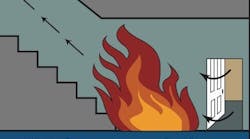July 22--For the first time in its 78-year history, Miami-Dade Fire Rescue has exceeded its overtime budget by so much that it has stopped operating 11 fire trucks and emergency vehicles, a move that could last until the end of September and reduce response times.
Called a "rolling brownout," the operation ordered by Chief Dave Downey will affect stations in most sectors of Miami-Dade, from Homestead through North Miami Beach. Firefighters on idled vehicles will be redistributed to other stations in an effort to save money by avoiding overtime.
The belt-tightening has nothing to do with the upcoming county budget, which may idle fire trucks and cut staff to save money.
"These are to meet the budget shortfalls for the [current] fiscal year. It's not that it will be less service, but there will be longer response times, unfortunately," said Fire Rescue Spokeswoman Michelle Fayad.
No station will close as the seven trucks and four emergency vehicles are shut down while Downey looks to cut $2 million in overtime from his $345 million budget. Typically Miami-Dade deploys four firefighters on each truck, and three on an emergency vehicle. Already the department has seen its average response time increase the past two years by 12 seconds, to eight minutes and 17 seconds.
The stations affected are in two in South Dade and one each in West Kendall, Miami Lakes, Miami Springs, Doral, Sweetwater, Miami Shores, Honey Hill, Sunny Isles and Uleta in North Miami Beach. The county has 139 trucks, 114 emergency vehicles and 67 stations. The fire department is funded by a tax that is different from the county's huge $4 billion operating budget. That means money can't be shuffled from other, more robust departments to cover the fire-rescue shortfall.
The effort comes at a particularly frustrating time for Downey, who is also facing the loss of six fire trucks and 149 of his 2,000 sworn officers in the next fiscal year, beginning Oct. 1, as administrators search for ways to plug a $15 million hole. It's also been a particularly sensitive time for County Mayor Carlos Gimenez -- a former fire chief for the city of Miami -- who initially recommended raising property taxes to avoid the shortfall, but later changed his mind as the public and commissioners complained of higher taxation.
The county is also facing a $20 million shortfall in its library system.
The brownouts haven't come without controversy: Some firefighters protested at a station in West Kendall on Sunset Drive Monday morning. By late afternoon they were airing their complaints at another station in Miami Lakes.
Rowan Taylor, president of Firefighters Local Union 1403. said the rank and file are upset, and blamed the administration for all the overtime because it refuses to hire 100 more firefighters already accounted for in the budget.
"We're putting the public's life in danger, and we're also putting firefighters' lives in danger who have to wait for backups," Taylor said.
Miami Lakes Mayor Michael Pizzi was also concerned -- especially, he said, because town leaders learned the local fire station had lost a truck only after Pizzi drove past the station Monday morning and saw some demonstrators.
"I'm shocked at the lack of coordination on this issue," said the mayor, adding that the nearest station is now a couple of miles north of his city. "There is no question in my mind this will reduce response time and could put residents in danger."
Deputy county mayor Chip Iglesias -- like Gimenez, a former high-ranking fire-rescue leader in Miami -- said the shutdowns would likely occur for 24-hour periods, and the county will rotate which vehicles are shut down because the union labor contract only allows three shut downs at a particular station three times in a budget year.
Iglesias pointed to a provision in the labor agreement that allows the brownouts, and said the goal is for residents not to be affected by the moves. He said they likely won't feel the effects any more than they would if employees called in sick, or a truck broke down.
"On any given day we could have units out of service for training," he said.
The deputy chief also said the brownouts are all about curbing overtime, and had nothing to do with filling the gap in next year's budget, which is more a result of increased healthcare and pension costs.
Copyright 2013 - The Miami Herald





